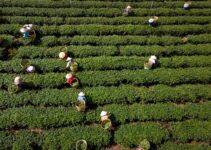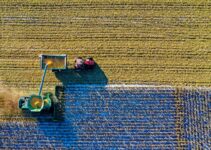I've explored the ecological impact of delta-8 hemp farms and uncovered crucial insights. From soil health to regulatory compliance, these farms have a significant influence on their surrounding environment. Understanding their effects is essential for sustainable agricultural practices and environmental stewardship.
Key Takeaways
- Composting organic matter and practicing nutrient cycling promote soil health and reduce the need for synthetic fertilizers, benefiting the overall ecological health of Delta-8 hemp farms.
- Efficient irrigation methods like drip irrigation and mulching minimize water usage, contributing to water conservation and farm sustainability.
- Integrated pest management strategies and the use of organic alternatives for pesticides and herbicides minimize the ecological impact of pest control on Delta-8 hemp farms.
- Conservation efforts, habitat restoration, and promoting biodiversity support ecosystem balance and contribute to the overall ecological health of Delta-8 hemp farms.
Soil Health and Nutrient Management
I believe that implementing sustainable soil health and nutrient management practices is crucial for maintaining the ecological balance at Delta-8 hemp farms. Composting benefits play a pivotal role in enhancing soil fertility and structure. By composting organic matter such as hemp stalks and leaves, we can enrich the soil with essential nutrients and improve its ability to retain moisture. This not only reduces the need for synthetic fertilizers but also promotes a healthier and more diverse microbial community in the soil. Additionally, nutrient cycling is essential for minimizing waste and maximizing resource efficiency. Through methods like cover cropping and crop rotation, we can balance nutrient levels in the soil, prevent nutrient runoff, and ultimately support the long-term sustainability of Delta-8 hemp farms. These practices not only benefit the soil but also contribute to the overall ecological health of the farm.
Water Usage and Conservation
Utilizing efficient irrigation methods is essential for minimizing water usage and promoting conservation on Delta-8 hemp farms. Reduced water consumption can be achieved through sustainable practices such as drip irrigation and mulching. Drip irrigation delivers water directly to the base of plants, reducing evaporation and water waste. Mulching helps retain soil moisture, reducing the need for frequent watering. Additionally, implementing water-saving technologies like soil moisture sensors can ensure that water is only applied when necessary. By optimizing irrigation practices and employing sustainable techniques, Delta-8 hemp farms can significantly reduce water usage while maintaining crop health. This not only benefits the environment by conserving water resources but also contributes to the overall sustainability of the farm.
Pesticide and Herbicide Practices
Regularly monitoring and promptly addressing pest and weed issues is essential for ensuring the health and productivity of Delta-8 hemp farms. To achieve this, integrated pest management (IPM) strategies are employed, focusing on natural predators, crop rotation, and beneficial insects to control pest populations. Additionally, organic alternatives such as neem oil and diatomaceous earth are utilized to minimize the use of synthetic pesticides. In terms of sustainable weed control, Delta-8 hemp farms prioritize natural solutions like mulching, hand-weeding, and cover cropping. These methods help to suppress weed growth and maintain soil health without relying heavily on herbicides. By implementing these practices, Delta-8 hemp farms can minimize the ecological impact of pesticide and herbicide use, ensuring the sustainability of their operations.
Biodiversity and Ecosystem Impact
Employing sustainable agricultural practices not only minimizes the ecological impact of pesticide and herbicide use but also plays a crucial role in maintaining biodiversity and ecosystem balance on Delta-8 hemp farms. Conservation efforts and habitat restoration are integral to promoting ecological balance and species diversity. By implementing these practices, Delta-8 hemp farms can provide a suitable environment for various species to thrive, contributing to overall ecosystem health. This approach fosters a balanced and resilient ecosystem where different species interact and support each other. The table below outlines the key factors in maintaining biodiversity and ecosystem balance on Delta-8 hemp farms.
| Factors | Description |
|---|---|
| Habitat Restoration | Reestablishing natural habitats to support diverse species |
| Conservation Efforts | Implementing measures to protect and preserve ecosystems |
| Species Diversity | Promoting the presence of various species in the ecosystem |
Carbon Footprint and Greenhouse Gas Emissions
To quantify the environmental impact, I monitor the carbon footprint and greenhouse gas emissions resulting from the daily operations of Delta-8 hemp farms.
- Carbon Footprint Monitoring
- Utilizing advanced analytics to measure the direct and indirect carbon emissions associated with the cultivation, processing, and transportation of Delta-8 hemp products.
- Implementing real-time tracking systems to assess the carbon footprint throughout the supply chain, from seed to shelf.
- Emission Reduction Strategies
- Introducing sustainable farming practices and energy-efficient technologies to minimize carbon emissions at the source.
- Collaborating with carbon offsetting programs to mitigate any remaining greenhouse gas emissions, ensuring a net-zero or carbon-negative impact.
Energy Consumption and Renewable Resources
As I explore the ecological effects of Delta-8 hemp farms, it's crucial to consider their energy consumption and use of renewable resources. Understanding the farm's energy efficiency and its impact on resources is essential for evaluating its ecological footprint. Additionally, examining the extent to which renewable energy sources are utilized in these farms will shed light on their commitment to sustainability.
Farm Energy Efficiency
I monitor our hemp farm's energy consumption and actively seek renewable resources. This involves optimizing the energy usage of farm equipment and incorporating sustainable solutions like solar panels.
- Farm Equipment
- Conduct regular maintenance and upgrades to ensure energy-efficient operation.
- Utilize modern equipment designed with energy-saving features to minimize consumption.
Impact on Resources
My hemp farm's energy consumption and utilization of renewable resources directly impact our ecological footprint and sustainability efforts. Resource conservation is at the core of our operations, and we continually assess our environmental impact to ensure responsible utilization of resources. Here's an overview of our energy consumption and renewable resource utilization:
| Energy Consumption | Renewable Resource Utilization |
|---|---|
| Regular assessment of energy use to identify areas for improvement | Integration of solar panels for on-site energy production |
| Implementation of energy-efficient lighting and equipment | Utilization of wind energy through strategically placed turbines |
| Embracing sustainable farming practices to reduce overall energy consumption | Utilization of biomass energy from organic waste |
Through these measures, we strive to minimize our environmental impact and contribute to the conservation of resources while maintaining the productivity of our hemp farm.
Renewable Energy Use
Our hemp farm's renewable energy use, including energy consumption and utilization of renewable resources, plays a crucial role in minimizing our ecological footprint and promoting sustainability.
- By harnessing solar power, we significantly reduce our reliance on non-renewable energy sources, lowering our carbon emissions and environmental impact.
- Installing solar panels on our farm buildings and facilities allows us to generate clean electricity to power operations and irrigation systems.
- The use of solar power also contributes to cost savings in the long run, making our farm more economically sustainable.
- Additionally, we have integrated wind energy into our renewable energy portfolio.
- Our wind turbines efficiently convert wind into electricity, providing a reliable source of clean power for various farm activities.
- Embracing wind energy aligns with our commitment to environmental stewardship and reinforces our dedication to sustainable practices.
Waste Management and Recycling
Implementing efficient waste management and recycling practices is crucial for minimizing environmental impact in Delta-8 hemp farms. Waste reduction is a primary focus, and it starts with careful monitoring and reduction of all forms of waste generated during the cultivation and processing of hemp. Composting methods play a vital role in managing organic waste. By composting plant matter and other organic materials, we can reduce the volume of waste sent to landfills while also creating nutrient-rich soil amendments for use in future hemp cultivation. Additionally, recycling initiatives are essential for managing non-organic waste materials such as plastics, cardboard, and other packaging materials. Through these efforts, Delta-8 hemp farms strive to minimize their ecological footprint and contribute to a more sustainable agricultural industry.
Pollinator Protection and Habitat Preservation
The waste management and recycling efforts at Delta-8 hemp farms significantly impact pollinator protection and habitat preservation, crucial for maintaining a balanced ecological environment.
- Pollinator Friendly Practices
- Implementing diverse flowering plants to support pollinators such as bees, butterflies, and birds.
- Avoiding the use of harmful pesticides that can negatively affect pollinator populations.
These practices not only safeguard pollinators but also contribute to wildlife habitat restoration, ensuring a thriving ecosystem for diverse species. By employing sustainable agricultural methods, Delta-8 hemp farms play a vital role in nurturing pollinator populations and preserving their natural habitats.
Local Community Engagement and Social Impact
While engaging with the local community, it is essential to foster positive social impact through transparent communication and collaborative initiatives. Community partnerships are crucial for Delta-8 hemp farms to establish a mutually beneficial relationship with the local residents. By actively involving the community in decision-making processes and seeking their input, we can ensure that our operations align with their needs and concerns. Moreover, demonstrating social responsibility through initiatives such as educational programs, job creation, and supporting local businesses can significantly contribute to the well-being of the community. Engaging in open dialogue and addressing any potential issues promptly is fundamental to building trust and fostering a positive social impact. These efforts not only benefit the local community but also contribute to the sustainability of our operations. Now, let's explore how regulatory compliance and best practices further support these initiatives.
Regulatory Compliance and Best Practices
As we explore the ecological effects of Delta-8 hemp farms, it's essential to consider regulatory compliance and best practices. Eco-friendly farming methods, sustainable land management, and adherence to environmental laws are crucial aspects that warrant attention. By ensuring compliance and implementing best practices, these farms can minimize their ecological footprint and contribute to a more sustainable agricultural industry.
Eco-Friendly Farming Methods
One essential aspect of eco-friendly farming methods involves ensuring compliance with regulations and implementing best practices to minimize environmental impact.
- Sustainable Practices
- Implementing crop rotation to maintain soil fertility and reduce the need for chemical fertilizers.
- Utilizing integrated pest management techniques to control pests without relying solely on pesticides.
Sustainable Land Management
Implementing sustainable land management practices, including regulatory compliance and best practices, is crucial for minimizing the environmental impact of Delta-8 hemp farms. Erosion control and regenerative practices play a significant role in preserving soil integrity and preventing nutrient runoff. Agroforestry, which involves integrating trees and shrubs into farming systems, helps in carbon sequestration and biodiversity conservation. Additionally, rotational grazing aids in maintaining soil health and optimizing pasture productivity. By adhering to regulatory standards and embracing best practices, Delta-8 hemp farms can mitigate the potential ecological effects associated with large-scale agricultural activities. Here's a table summarizing some sustainable land management practices:
| Sustainable Land Management Practices | Benefits |
|---|---|
| Erosion control | Preserves soil integrity |
| Regenerative practices | Prevents nutrient runoff |
| Agroforestry | Carbon sequestration, biodiversity conservation |
| Rotational grazing | Maintains soil health, optimizes pasture productivity |
Compliance With Environmental Laws
Adhering to the environmental laws and best practices is crucial for minimizing the ecological impact of Delta-8 hemp farms. Legal compliance ensures that the farming activities are conducted within the framework of environmental regulations, preventing harm to the surrounding ecosystems. This includes proper waste management, water usage, and soil conservation to mitigate the environmental impact. Moreover, it involves obtaining necessary permits, adhering to zoning regulations, and implementing practices that protect wildlife and biodiversity. Additionally, it requires the responsible use of pesticides and other agricultural inputs to prevent contamination of soil and water sources. By complying with environmental laws and best practices, Delta-8 hemp farms can operate sustainably, minimizing their environmental footprint and contributing to the overall health of the ecosystem.
Moving forward, let's delve into the aspects of sustainable agriculture and certification.
Sustainable Agriculture and Certification
As a hemp farmer, I aim to cultivate my crops with sustainable practices and obtain the necessary certifications for environmental stewardship. This involves following the certification process for organic farming practices, which ensures that my farming methods are environmentally friendly and promote ecological balance. By adhering to these standards, I not only contribute to the preservation of the environment but also provide consumers with high-quality, organically grown hemp products. Below is a table outlining the certifications I aim to achieve and the benefits they bring to the environment and consumers:
| Certification | Benefits |
|---|---|
| USDA Organic | Ensures the use of natural fertilizers and prohibits the use of synthetic substances. |
| Rainforest Alliance | Promotes biodiversity, improved livelihoods, and human well-being in farming communities. |
| Fair Trade | Supports fair prices, direct trade, community development, and environmental sustainability. |
| Non-GMO Project | Ensures products are made according to best practices for GMO avoidance. |
These certifications not only validate my commitment to sustainable agriculture but also assure consumers of the environmental and ethical standards upheld in my hemp farming practices.
Frequently Asked Questions
How Do Delta-8 Hemp Farms Affect the Mental and Physical Well-Being of Local Community Members?
Delta-8 hemp farms engage the community through economic opportunities and potential health impacts. Community engagement involves open dialogue and collaboration, while health impact considerations prioritize local well-being. Both aspects require ongoing assessment and proactive involvement.
What Measures Are in Place to Ensure Fair Labor Practices and Worker Safety on Delta-8 Hemp Farms?
Ensuring fair labor practices and worker safety on delta-8 hemp farms is crucial. We implement regular training, provide protective gear, and have protocols for handling hazardous materials. Our goal is to prioritize the well-being of our workers.
How Do Delta-8 Hemp Farms Contribute to the Economic Development of the Local Community?
Delta-8 hemp farms contribute to economic development by creating jobs and engaging with the local community. Their impact on the economy is significant, fostering growth and sustainability. Community engagement is vital for building strong, mutually beneficial relationships.
What Steps Are Taken to Minimize the Impact of Delta-8 Hemp Farms on Wildlife Habitats and Migration Patterns?
To minimize impact on wildlife habitats and migration patterns, we implement wildlife conservation measures and prioritize habitat preservation. This includes maintaining buffer zones, utilizing sustainable farming practices, and collaborating with experts to ensure ecological balance.
How Do Delta-8 Hemp Farms Work With Local Government and Regulatory Bodies to Ensure Compliance With Environmental and Farming Regulations?
Working with local partnerships and regulatory bodies is crucial for ensuring compliance with environmental and farming regulations. Environmental stewardship is a top priority, so we actively engage with the government to uphold these standards.
Conclusion
After researching the ecological effects of delta-8 hemp farms, it is clear that there are both positive and negative impacts on the environment. While sustainable practices can promote soil health, conserve water, and protect biodiversity, there are also concerns about pesticide use and carbon emissions. Moving forward, it is important for hemp farms to prioritize sustainable agriculture, regulatory compliance, and community engagement to minimize their ecological footprint and ensure a more positive impact on the environment.





